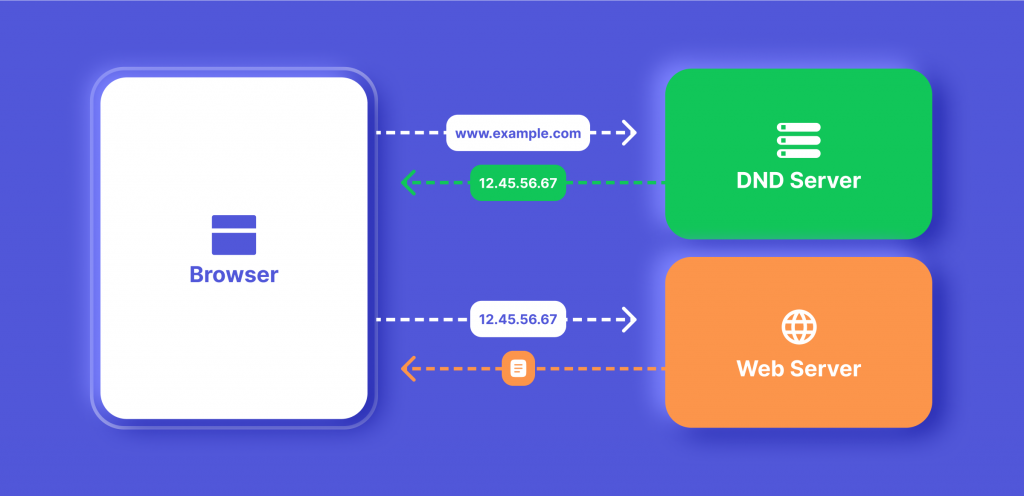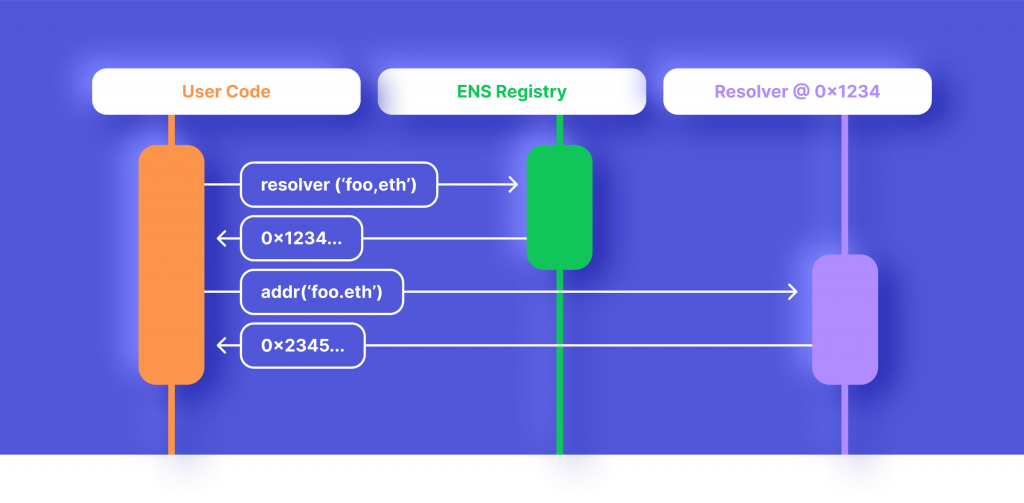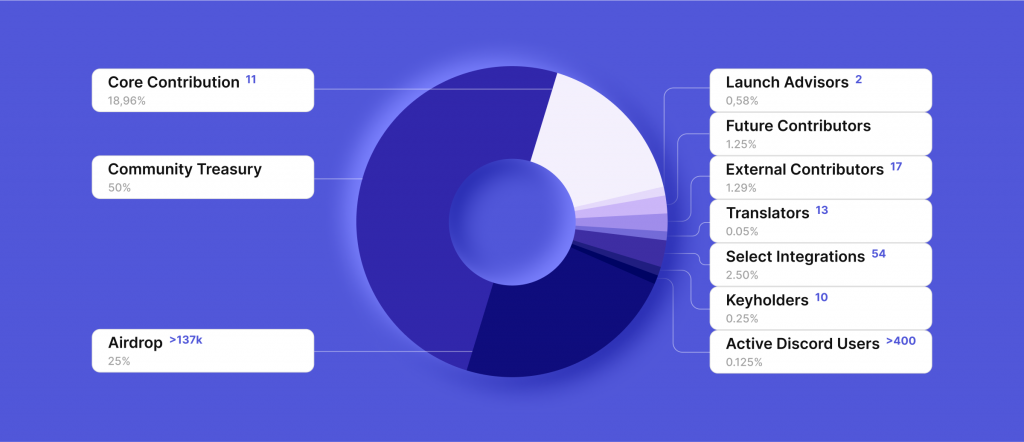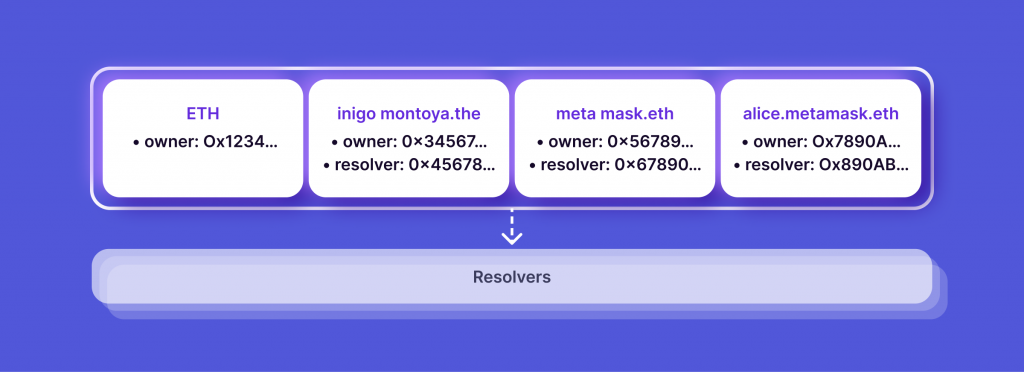What is ENS? Understanding Ethereum Name Service Technology.
The Domain Name System (DNS) has been the backbone of the internet since its inception. By linking names that users can comprehend to numerical internet protocol (IP) addresses, DNS enables people to access websites and web services around the world with ease.
Ethereum Name Service (ENS) was created as an alternative to the Domain Name System for blockchain. In this article, we will explore what ENS is, how it works, and its potential applications.
Key Takeaways:
- ENS is a decentralised and secure alternative to DNS that simplifies crypto addresses with human-readable domain names.
- ENS consists of two primary components: the registry and the resolvers.
- ENS tokens play a pivotal role in the Ethereum Name Service, providing holders with the ability to exercise DAO voting rights. Additionally, these tokens empower users to engage in various ENS-related actions, such as bidding, extending, transferring, or withholding ENS names.
- ENS facilitates the establishment of decentralised websites for enhanced privacy and censorship resistance, as well as allows users to establish unique digital identities for seamless interaction within the blockchain ecosystem.
What is Ethereum Name Service (ENS)?
ENS is an open-source naming system that works on the Ethereum blockchain. It has been designed to enable users to look up human-readable names, such as websites, wallets and smart contracts, by using their numerical addresses.
ENS makes it easier for users to send and receive funds as they are able to use their username, such as ‘yourname.eth’ instead of a long address like 0xF58D4580C8J83RT4H6072F53A76d925. This makes the user experience smoother and also reduces the chance of errors when sending or receiving funds.
Businesses can benefit from using ENS as they can create a custom domain name such as ‘businessname.eth’ for their customers to send them funds.
How Does ENS Work?
An ENS name is a unique address that uses ERC-721 Non-Fungible Tokens (NFTs) to represent it. With each token, wallet addresses and other important information are attached and can be managed by the owner. Additionally, top-level domains like .eth are owned by smart contracts referred to as registrars, which control the creation of subdomains. Through the transfer or sale of an NFT, you can easily trade a domain to someone else.
The ENS system is made up of two main components: the registry and the resolvers.

- The ENS registry is a smart contract that stores all registered domain names and associated information, such as the owner of the domain, its resolver, and its caching time-to-live.
- The resolvers are responsible for translating the domain names into actual addresses. Any contract that meets the required standards can be a resolver in the ENS system.
The name-resolving process is done in several steps:
First, the registry is queried to determine which resolver is responsible for it. The second step is to query that particular resolver for the answer to the original query.

ENS vs. DNS
ENS and DNS are similar in that they both provide a way to link human-readable domain names with numerical addresses. However, there are several key differences between the two.
The main difference is that the DNS is centralised while ENS is decentralised. This means that any changes made to a domain name in DNS must be done through a centralised registry, which makes it more vulnerable to censorship and manipulation. On the other hand, ENS is based on the Ethereum blockchain and runs on smart contracts, making it resistant to central control or censorship.

Secondly, ENS simplifies crypto addresses, transforming long strings of numbers into short codes. For example, a typical Ethereum address ‘0x014875y31r482G88fe8718rfrw9574813f’ can be replaced with an ENS name such as ‘thebestadress.eth’. In contrast, DNS simplifies website URLs, matching IP addresses with human-friendly domain names.
ENS Token
ENS tokens are ERC-20 compatible tokens that grant ENS DAO voting rights, affecting its direction and future development. The tokens are used to incentivize users to create domain names, allowing them to bid on a particular name as an auction or trade it with other users.
Fast Fact:
A Decentralised Autonomous Organization (DAO) is an organisation that operates through smart contracts on a blockchain network. This form of decentralised governance eliminates the need for traditional, centralised management structures and allows for more efficient decision-making processes.
One of the most significant and impactful collaborations among ENS token holders is the collective effort in creating the ENS Constitution. This constitution serves as a guiding document that outlines the principles, values, and rules that govern the ENS ecosystem.
To give ENS domain shoppers confidence, the constitution ensures that owners have full control over naming, extending, transferring, or withholding ENS names. Token holders can propose amendments, but such additions must receive at least 100,000 votes to be considered eligible.
The ENS token was airdropped to early adopters who had previously registered an ENS name. The claiming process, which began on November 8th, 2021, provided a window of opportunity for users to secure their allocated tokens until May 4th, 2022.
During this period, participants eagerly awaited the distribution of their tokens, which accounted for 25% of the total supply. The remaining percentage of tokens was allocated according to the distribution plan, which involved the strategic allocation of ENS tokens across various stakeholders and entities.

ENS tokens can be easily accessed and traded on various major exchanges. These include popular platforms like Binance, OKX, FTX, and Bitget. Moreover, for those who prefer decentralised exchanges, ENS tokens are also available in liquidity pools on well-known platforms such as Uniswap, SushiSwap, and 1inch.
Applications of ENS
ENS provides several use cases, ranging from enabling users and businesses to register custom domain names to creating aliases for wallets.
Crypto Wallets
One of the most common use cases for the Ethereum Name Service is to help securely store cryptocurrencies in wallets and facilitate seamless exchanges. With ENS, users can easily buy, sell, send, and receive cryptocurrencies, all while enjoying the benefits of decentralised and user-friendly address systems. It’s worth noting that ENS supports the addresses of any cryptocurrency or blockchain, providing flexibility and convenience to users across various digital assets.
Decentralised Websites
ENS enables the launch of censorship-resistant decentralised websites. With this revolutionary technology, you can effortlessly upload your website to the IPFS (InterPlanetary File System) and access it using an ENS name.
Fast Fact:
ENS expanded its capabilities in 2019 by introducing support for decentralised websites using IPFS and Swarm networks. Additionally, it incorporated support for Tor .onion and multi-coin addresses, enabling users to store cryptocurrency addresses in their name records.
ENS-IPFS websites enjoy support from various popular browsers and apps such as Brave, Opera, MetaMask, and Status, among others. For users accessing ENS-IPFS websites from browsers that do not have built-in support, there is an option to append “.link” to their .eth website name using a system known as EthDNS.
Identity
An ENS address is an effective way of creating a digital identity on the web. All sorts of personal information, like email addresses and avatars, can be attached to an ENS username, making them potentially the primary means of digital identification.
What’s the Benefit of Owning an ENS Domain?
ENS allows users to send funds quickly and easily, as opposed to having to copy or type lengthy hexadecimal addresses. By acquiring an ENS domain, you can point it to any funds you choose and also create subdomains that are assigned according to your own preferences.
How to Register Your Own ENS Name?
Registering your ENS domain is a relatively straightforward process. Users will need to follow the steps outlined below:
1. Go to the https://app.ens.domains/ and check the availability of the ENS name in the registry.
2. Create a wallet with sufficient funds to pay for registration, gas fees, and resolver fees and link it to the website.
3. Once you find the name you want, click on it.
4. Next, you will see instructions for registering your domain. You have the flexibility to select your registration period and view an estimated cost. By having Ether (ETH) in your wallet, you can follow the three indicated steps to initiate a request for address registration.
To register an Ethereum domain name, you can rent it for a yearly fee. Initially, popular domain names were auctioned off to the highest bidder who had the right to set up addresses, create sub-domains, loan or even sell their newly acquired domain name.
ENS Auctions
In the early days of ENS, popular names with three to six letters were auctioned off using auctions. For five days, a smart contract facilitated the process, allowing anyone to participate in a public auction and attempt to purchase the specific domain name. During the first three days of each open auction, interested parties would send transactions containing their maximum bids.
The auction would then progress to the reveal phase, during which all bidders had to reveal their bid or lose any ETH that they had locked up for the auction. The winning bidder would pay an amount equal to the second-highest bid, and all revealed bids received a refund.
What is the Cost of Getting an ENS Domain?
Getting an ENS domain can be expensive, depending on the popularity of the name you’re looking for. Prices for recognizable names like God, Car, or ETH may have been higher than others in past auctions. In general, shorter three-letter words are typically the most expensive. For example, a certain three-letter word sold for over 3 ETH and another word with 4 characters sold for 1 ETH in past auctions.
Once you become the proud owner of an ENS domain, you’ll need to be aware of the yearly renewal cost to keep it active. The fee is calculated based on the prevailing exchange rate using the reliable Chainlink ETH/USD oracle.
To be more specific, for ENS names containing five characters or more, the annual renewal cost is set at an affordable $5 per year. However, if you happen to have a name with fewer than five characters, the renewal cost will be slightly higher.
Drawbacks of ENS
Although ENS provides many advantages, there are also potential downsides. First of all, it relies on blockchain technology and, as a result, is subject to certain limitations in terms of speed and scalability. This can be an issue for applications that require real-time updates or need to process large amounts of data quickly. Additionally, ENS can only be used with the Ethereum blockchain, which limits its potential applications to those that are compatible with this platform.
Furthermore, even though ENS provides a certain level of privacy, it can still reveal wallet balances and movements. This issue is especially relevant for high-profile users who may not want to disclose their financial information even with pseudonymity.
Finally, ENS can be expensive and requires a certain level of technical knowledge to set up and use. This may make it prohibitively difficult for less tech-savvy users. Even though the process is straightforward, like setting up an Ethereum wallet, it still involves time, energy, and some degree of understanding of blockchain technology. As such, users should carefully consider the potential costs and benefits of using ENS before taking the plunge.
Closing Thoughts
ENS provides an innovative platform for users to register domain names, create aliases for wallets, and launch decentralised websites. With the help of ENS, businesses and users can enjoy the benefits of a secure, reliable address system that works with multiple blockchains and digital assets.
Despite potential drawbacks such as scalability issues and high associated costs, ENS remains an attractive option for those who are looking for a robust, decentralised digital identity system. With increasing adoption and wider availability of ENS-enabled applications, the future looks bright for this revolutionary technology.
It is safe to say that concepts like ECN are here to stay.
FAQ
How secure is an ENS domain name and its related data?
The Ethereum Name Service (ENS) offers excellent security for domain names and associated data. A domain name registered with ENS is secured using the same technology that secures all other data on the Ethereum blockchain, making it virtually impossible to hack or tamper with its records. Additionally, each ENS domain is associated with a unique wallet address, meaning that only those who are authorised to access the wallet address can manage or transfer ownership of the domain name.
Are there any limitations when using ENS?
Yes, although ENS can be used to register domain names, it is currently limited to the .eth top-level domain. This means you cannot use other popular domains such as .com or .org with ENS. Additionally, because of the decentralised nature of Ethereum and its smart contract technology, there are certain processes that take place on-chain, which may require more time to verify than traditional domain registrars.
What is the process for registering an ENS domain name?
The process for registering an ENS domain name is very straightforward. First, choose a unique name and create an associated wallet address. Then sign up for the Ethereum Name Service, and enter your chosen domain name along with your wallet address. Finally, pay the registration fee in Ether using your wallet to complete the registration process.
Is there a cost associated with registering an ENS domain name?
Yes, registering an ENS domain name requires a fee in Ether. This fee is set by the registrar and can vary depending on the demand for the specific domain name being registered. Additionally, there may also be renewal fees associated with maintaining an ENS domain name.
How long does it take to register an ENS domain?
Generally, registering an ENS domain name should take less than 10 minutes. This includes the time required to create a wallet address, fill out the registration form, and submit payment via your wallet. However, verifying the registration on the Ethereum blockchain may take longer due to network congestion.
What are some common uses for ENS technology?
ENS technology is most commonly used to register domain names for websites, applications, and even cryptocurrency wallets. ENS can also be used to store data such as cryptographic keys, social media accounts, or email addresses associated with the domain name.



